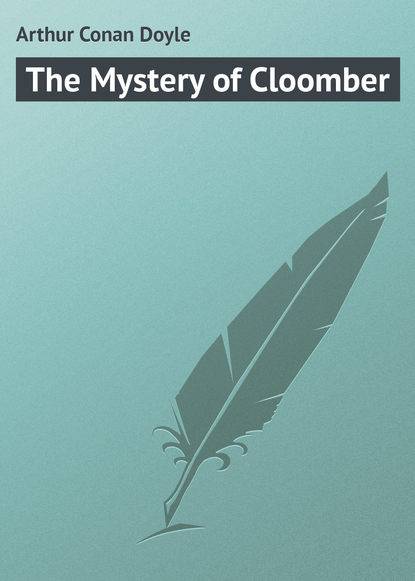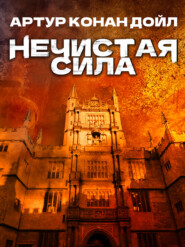По всем вопросам обращайтесь на: info@litportal.ru
(©) 2003-2025.
✖
The Mystery of Cloomber
Настройки чтения
Размер шрифта
Высота строк
Поля
"You surely don't mean to cast an aspersion upon your own daughter?" I said, flushing with indignation.
"Oh, Gabriel is all right," he answered carelessly. "Our family is not exactly one, however, which I should recommend a young fellow to marry into. And pray how is it that I was not informed of this snug little arrangement of yours?"
"We were afraid, sir, that you might separate us," I replied, feeling that perfect candour was the best policy under the circumstances. "It is possible that we were mistaken. Before coming to any final decision, I implore you to remember that the happiness of both of us is at stake. It is in your power to divide our bodies, but our souls shall be for ever united."
"My good fellow," said the general, in a not unkindly tone, "you don't know what you are asking for. There is a gulf between you and any one of the blood of Heatherstone which can never be bridged over."
All trace of anger had vanished now from his manner, and given place to an air of somewhat contemptuous amusement.
My family pride took fire at his words. "The gulf may be less than you imagine," I said coldly. "We are not clodhoppers because we live in this out-of-the-way place. I am of noble descent on one side, and my mother was a Buchan of Buchan, I assure you that there is no such disparity between us as you seem to imagine."
"You misunderstand me," the general answered. "It is on our side that the disparity lies. There are reasons why my daughter Gabriel should live and die single. It would not be to your advantage to marry her."
"But surely, sir," I persisted, "I am the best judge of my own interests and advantages. Since you take this ground all becomes easy, for I do assure you that the one interest which overrides all others is that I should have the woman I love for my wife. If this is your only objection to our match you may surely give us your consent, for any danger or trial which I may incur in marrying Gabriel will not weigh with me one featherweight."
"Here's a young bantam!" exclaimed the old soldier, smiling at my warmth. "It's easy to defy danger when you don't know what the danger is."
"What is it, then?" I asked, hotly. "There is no earthly peril which will drive me from Gabriel's side. Let me know what it is and test me."
"No, no. That would never do," he answered with a sigh, and then, thoughtfully, as if speaking his mind aloud: "He has plenty of pluck and is a well-grown lad, too. We might do worse than make use of him."
He went on mumbling to himself with a vacant stare in his eyes as if he had forgotten my presence.
"Look here, West," he said presently. "You'll excuse me if I spoke hastily a little time ago. It is the second time that I have had occasion to apologise to you for the same offence. It shan't occur again. I am rather over-particular, no doubt, in my desire for complete isolation, but I have good reasons for insisting on the point. Rightly or wrongly, I have got it into my head that some day there might be an organised raid upon my grounds. If anything of the sort should occur I suppose I might reckon upon your assistance?"
"With all my heart."
"So that if ever you got a message such as 'Come up,' or even 'Cloomber,' you would know that it was an appeal for help, and would hurry up immediately, even if it were in the dead of the night?"
"Most certainly I should," I answered. "But might I ask you what the nature of the danger is which you apprehend?"
"There would be nothing gained by your knowing. Indeed, you would hardly understand it if I told you. I must bid you good day now, for I have stayed with you too long. Remember, I count upon you as one of the Cloomber garrison now."
"One other thing, sir," I said hurriedly, for he was turning away," I hope that you will not be angry with your daughter for anything which I have told you. It was for my sake that she kept it all secret from you."
"All right," he said, with his cold, inscrutable smile. "I am not such an ogre in the bosom of my family as you seem to think. As to this marriage question, I should advise you as a friend to let it drop altogether, but if that is impossible I must insist that it stand over completely for the present. It is impossible to say what unexpected turn events may take. Good-bye."
He plunged into the wood and was quickly out of sight among the dense plantation.
Thus ended this extraordinary interview, in which this strange man had begun by pointing a loaded pistol at my breast and had ended, by partially acknowledging the possibility of my becoming his future son– in-law. I hardly knew whether to be cast down or elated over it.
On the one hand he was likely, by keeping a closer watch over his daughter, to prevent us from communicating as freely as we had done hitherto. Against this there was the advantage of having obtained an implied consent to the renewal of my suit at some future date. On the whole, I came to the conclusion as I walked thoughtfully home that I had improved my position by the incident.
But this danger – this shadowy, unspeakable danger – which appeared to rise up at every turn, and to hang day and night over the towers of Cloomber! Rack my brain as I would, I could not conjure up any solution to the problem which was not puerile and inadequate.
One fact struck me as being significant. Both the father and the son had assured me, independently of each other, that if I were told what the peril was, I would hardly realise its significance. How strange and bizarre must the fear be which can scarcely be expressed in intelligible language!
I held up my hand in the darkness before I turned to sleep that night, and I swore that no power of man or devil should ever weaken my love for the woman whose pure heart I had had the good fortune to win.
VII. Of corporal Rufus Smith and his coming to Cloomber
In making this statement I have purposely couched it in bald and simple language, for fear I should be accused of colouring my narrative for the sake of effect. If, however, I have told my story with any approach to realism, the reader will understand me when I say that by this time the succession of dramatic incidents which had occurred had arrested my attention and excited my imagination to the exclusion of all minor topics.
How could I plod through the dull routine of an agent's work, or interest myself in the thatch of this tenant's bothy or the sails of that one's boat, when my mind was taken up by the chain of events which I have described, and was still busy seeking an explanation for them.
Go where I would over the countryside, I could see the square, white tower shooting out from among the trees, and beneath that tower this ill-fated family were watching and waiting, waiting and watching – and for what? That was still the question which stood like an impassable barrier at the end of every train of thought.
Regarded merely as an abstract problem, this mystery of the Heatherstone family had a lurid fascination about it, but when the woman whom I loved a thousandfold better than I did myself proved to be so deeply interested in the solution, I felt that it was impossible to turn my thoughts to anything else until it had been finally cleared up.
My good father had received a letter from the laird, dated from Naples, which told us that he had derived much benefit from the change, and that he had no intention of returning to Scotland for some time. This was satisfactory to all of us, for my father had found Branksome such an excellent place for study that it would have been a sore trial to him to return to the noise and tumult of a city. As to my dear sister and myself, there were, as I have shown, stronger reasons still to make us love the Wigtownshire moors.
In spite of my interview with the general – or perhaps I might say on account of it – I took occasion at least twice a day to walk towards Cloomber and satisfy myself that all was well there. He had begun by resenting my intrusion, but he had ended by taking me into a sort of half-confidence, and even by asking my assistance, so I felt that I stood upon a different footing with him than I had done formerly, and that he was less likely to be annoyed by my presence. Indeed, I met him pacing round the inclosure a few days afterwards, and his manner towards me was civil, though he made no allusion to our former conversation.
He appeared to be still in an extreme state of nervousness, starting from time to time, and gazing furtively about him, with little frightened, darting glances to the right and the left. I hoped that his daughter was right in naming the fifth of October as the turning point of his complaint, for it was evident to me as I looked at his gleaming eyes and quivering hands, that a man could not live long in such a state of nervous tension.
I found on examination that he had had the loose rails securely fastened so as to block up our former trysting-place, and though I prowled round the whole long line of fencing, I was unable to find any other place where an entrance could be effected.
Here and there between the few chinks left in the barrier I could catch glimpses of the Hall, and once I saw a rough-looking, middle-aged man standing at a window on the lower floor, whom I supposed to be Israel Stakes, the coachman. There was no sign, however, of Gabriel or of Mordaunt, and their absence alarmed me. I was convinced that, unless they were under some restraint, they would have managed to communicate with my sister or myself. My fears became more and more acute as day followed day without our seeing or hearing anything of them.
One morning – it was the second day of October – I was walking towards the Hall, hoping that I might be fortunate enough to learn some news of my darling, when I observed a man perched upon a stone at the side of the road.
As I came nearer to him I could see that he was a stranger, and from his dusty clothes and dilapidated appearance he seemed to have come from a distance. He had a great hunch of bread on his knee and a clasp-knife in his hand, but he had apparently just finished his breakfast, for he brushed the crumbs off his lap and rose to his feet when he perceived me.
Noticing the great height of the fellow and that he still held his weapon, I kept well to the other side of the road, for I knew that destitution makes men desperate and that the chain that glittered on my waistcoat might be too great a temptation to him upon this lonely highway. I was confirmed in my fears when I saw him step out into the centre of the road and bar my progress.
"Well, my lad," I said, affecting an ease which I by no means felt, "what can I do for you this morning?"
The fellow's face was the colour of mahogany with exposure to the weather, and he had a deep scar from the corner of his mouth to his ear, which by no means improved his appearance. His hair was grizzled, but his figure was stalwart, and his fur cap was cocked on one side so as to give him a rakish, semi-military appearance. Altogether he gave me the impression of being one of the most dangerous types of tramp that I had ever fallen in with.
Instead of replying to my question, he eyed me for some time in silence with sullen, yellow-shot eyes, and then closed his knife with a loud snick.
"You're not a beak," he said, "too young for that, I guess. They had me in chokey at Paisley and they had me in chokey at Wigtown, but by the living thunder if another of them lays a hand on me I'll make him remember Corporal Rufus Smith! It's a darned fine country this, where they won't give a man work, and then lay him by the heels for having no visible means of subsistence."
"I am sorry to see an old soldier so reduced," said I. "What corps did you serve in?"
"H Battery, Royal Horse Artillery. Bad cess to the Service and every one in it! Here I am nigh sixty years of age, with a beggarly pension of thirty-eight pound ten – not enough to keep me in beer and baccy."
"I should have thought thirty-eight pound ten a year would have been a nice help to you in your old age," I remarked.
"Would you, though?" he answered with a sneer, pushing his weather– beaten face forward until it was within a foot of my own.
"How much d'ye think that slash with a tulwar is worth? And my foot with all the bones rattling about like a bagful of dice where the trail of the gun went across it. What's that worth, eh? And a liver like a sponge, and ague whenever the wind comes round to the east – what's the market value of that? Would you take the lot for a dirty forty pound a year – would you now?"
"We are poor folk in this part of the country," I answered. "You would pass for a rich man down here."
"They are fool folk and they have fool tastes," said he, drawing a black pipe from his pocket and stuffing it with tobacco. "I know what good living is, and, by cripes! while I have a shilling in my pocket I like to spend it as a shilling should be spent. I've fought for my country and my country has done darned little for me. I'll go to the Rooshians, so help me! I could show them how to cross the Himalayas so that it would puzzle either Afghans or British to stop 'em. What's that secret worth in St. Petersburg, eh, mister?"
"I am ashamed to hear an old soldier speak so, even in jest," said I sternly.

















